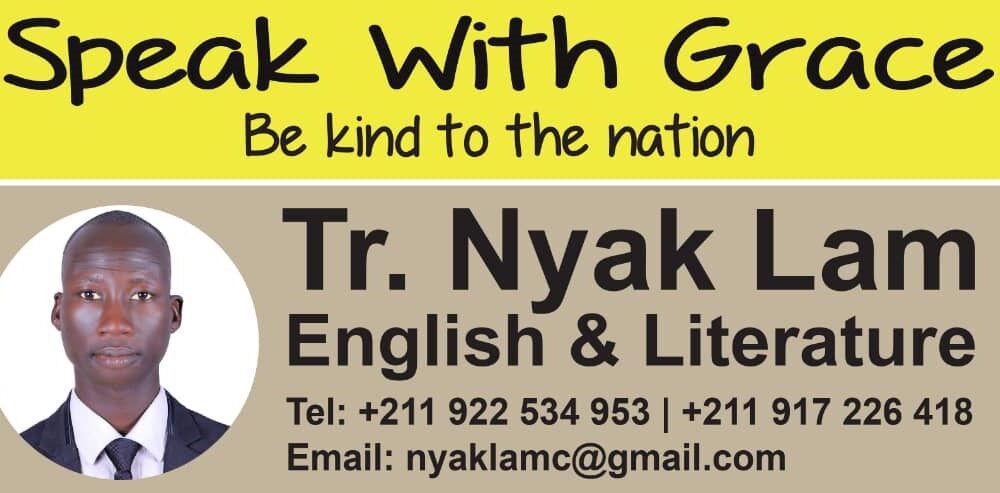Humans mourn their loved ones. If you lose someone in the family, you must mourn whether you like the person or not. I believe culture demands it.
It is like burying a dead body. In Africa, it is a curse to leave a dead body unburied. Maybe only until these days when love for one another is almost impossible.
I had a class with my students on Culture and Society. From that class, I had learned to think of mourning our national languages. The South Sudan Senior Four English Language has a topic, “Culture and Society”. As a person trained in the important of national languages, I celebrated knowing that my students and I were going to learn something. I had to organize the class to discuss certain questions on the topic.
I put the students in groups according to their tribes. I had only less than twenty tribes in my class. I was shocked! South Sudan has 64 tribes, so why only seven tribes in a big class of more than a hundred students? I had a group of Bari speakers including Kakwa, Mundari, Kuku, Nyangwara, Bari, Pojulu, among others. I had a group of Dinka, Moru, Acholi, Nuer, Shilluk, Didinga, Baka, Zande, Lango, Madi to mention a few. They were happy being grouped into tribes.
After grouping them according to their tribes, I instructed all of them to write a brief history of each of their tribes, and describe and demonstrate their cultural practices such as child naming, marriage ceremonies, initiation ceremonies, and many others. I asked each tribe to demonstrate their cultural dance and cook their cultural food. They did everything perfectly.
The worst was to come! During the presentations, I asked each tribe to present in their language and then have another person from the same tribe translate. It was horrible! I was very ashamed that my students could not speak their own languages! It was only a few of them who managed to speak a few words in their languages apart from Dinka, Nuer and Shilluk students. The Dinka, Nuer and Shilluk students are still fair in their languages. I mean fair! It was really a drama having students who could not speak their own languages.
After the presentations, I asked them why they could not speak their languages. They told me things which every South Sudanese reader must note with care.
Most of them said their parents don’t teach them their own languages at home. The parents ignore teaching the children their languages. They are only taught to speak Arabic. They are born thinking that their mother tongue is Arabic or English.
I believe my students are right. The parents have the full responsibility of teaching their children their mother tongue. They can’t speak the language if they are not taught to speak the language. Parents must know that language identifies. You are a Pojulu because you speak Pojulu. We must teach our children our languages if we want to remain Zande or other tribes. Teaching children your language will make them speak your language.
Many students admitted that they used to speak their languages but they lost their languages because they don’t speak them at home. Everyone speaks either Arabic or English. No one bothers to speak in the local languages.
Children need to speak only their local languages at home. When they come to school, they are told to speak only in English. When they go to the market, they speak Arabic or English. If we are to be honest, where do we expect them to speak their local languages? It is the fault of the parents. Parents must regulate that their local language is only spoken at home. It will help the children to speak the language.
Some children complained that their parents are not from the same tribe. The parents only use Arabic or English to communicate with each other and to their children as well. The two parents don’t bother to teach their children their two languages. This is also the parents’ fault. They should teach the two languages to their children. It is even advantageous for the children to be bilingual. Parents, intermarriage should not be an excuse to lose your languages. You don’t intermarry to lose your identity. You intermarry to expand your identity.
This must be a shock to you! Almost all the students concluded that local languages are for the villagers. They think they will be local if they speak local languages. The students assume that only people in the village are entitled to speak the local languages. The people in the city are civilized and can only speak English or Arabic, they think!
Do you agree local languages should only be spoken in the villages? Parents, is that what we teach our children? Civilization has no connection with a language. Civilization is character. A person who understands whether in the city or village is civilized. A language is meant for communication. A language is meant for identifying us. If we say it is the people in the village who we think are not civilized to speak the local languages, who are we then?
Are we whites or Arabs? The local languages will identify the villages as the citizens of South Sudan. South Sudan belongs to South Sudanese. And South Sudanese are those who speak South Sudanese languages. We in the towns should leave South Sudan and go to where we think we belong.
Speaking our local languages has a lot of benefits. It helps us preserve our cultures. A society without a culture is a diverted society. We should keep our cultures for the next people to come. We will continue to keep our family line if we continue to speak our local languages. We are a family. A family has history. It is the language which will remind us of that history. We always feel normal with one another if we speak the same language.
People speaking the same language don’t feel strange to each other. Language is the source of our unity. Speaking our languages too will make us feel natural. I speak English but I always feel a stranger when speaking it. I know I am not a native. I pay a lot of attention when speaking English so that I don’t speak it wrongly. But I never pay any attention when I speak my local language. I am natural and everyone hears me a native. Speaking our local languages has numberless benefits.
Does this bring hatred for Arabic and English? It is a perfect, “NO”! It is important to speak Arabic and English but they must not replace our local languages. We know English is the official language in South Sudan. It means, it is to be used in official places. Reaching home, English is never official. Arabic is the common language. It can be used in common places like market, churches and others. Reaching home it is not common.
I teach English. I always teach my students to speak good English. English is the only language used in my school. We dismiss students for speaking other languages. Our intention is not to get rid of the national languages. We mean to tell the students that they should speak English because they are going to work in the offices which will demand good English. People are mixed in the offices. It is only English or Arabic that can help them communicate to each other.
Here is the wrong side of the story. We should not use our local languages to divide us. I have observed that until you speak a language of someone that you are welcome in certain places. We must learn to accept each other not based on the language. Our different languages communicate our uniqueness. Let us learn to appreciate one another’s languages. We should instead learn our different languages. It is lovely to speak many languages! People love those who can speak their language. I am trying my best to learn many languages. At least I can speak a word in Pazande, Thok Monyjang, Acholi, Moru, Madi, Shilluk and Anyuak. I will soon speak from the rest.
I should not feel that my language is superior to the rest of the local languages. Some people have such ill attitude. Every natural language is important. We must learn to embrace all of them. I know the majority think they are important than the minority. It is not true. My language remains important even if it is only me speaking it. Every south Sudanese language is superior. Let us change our attitude.
Let us respect public places. I have just learned that if an office has ten people and seven of them are from one tribe. The seven speak in local language. It is not good. We should know we are causing division in the office. The members from the other tribes will not feel good if they hear you speaking in your local language.
They may suspect that you are speaking against them. We must speak our local languages where it won’t bring division.
Let’s resurrect the national languages. Our languages define our true identity. Be kind to the Nation.




